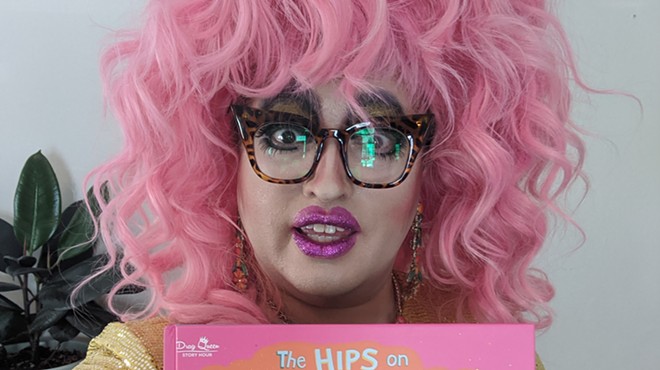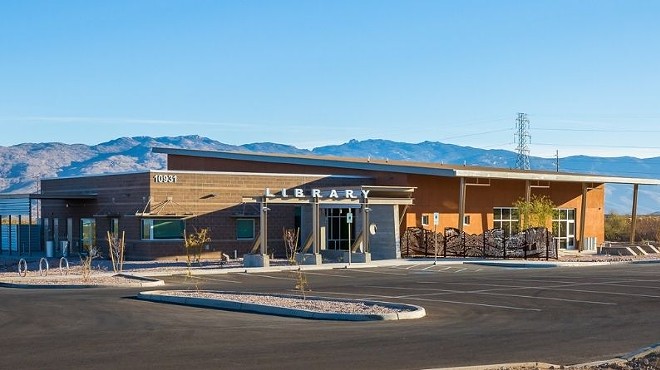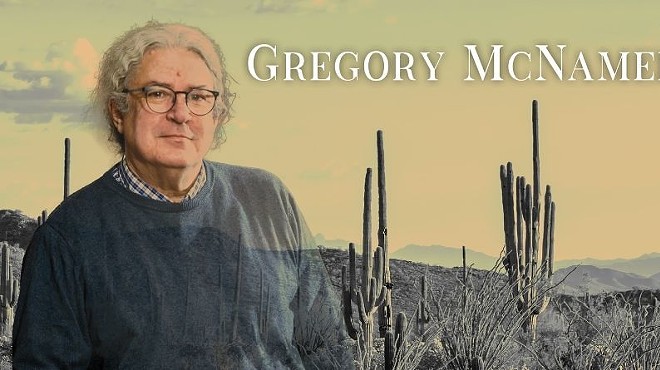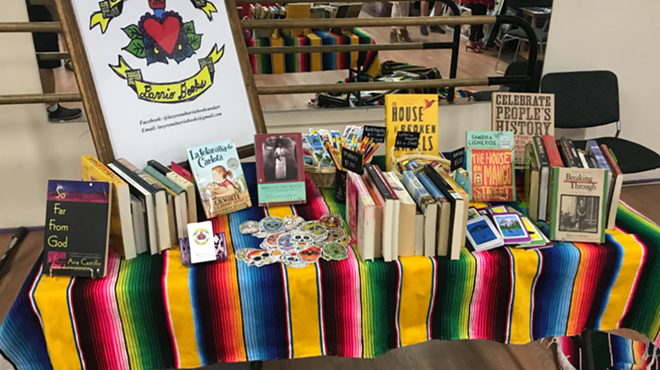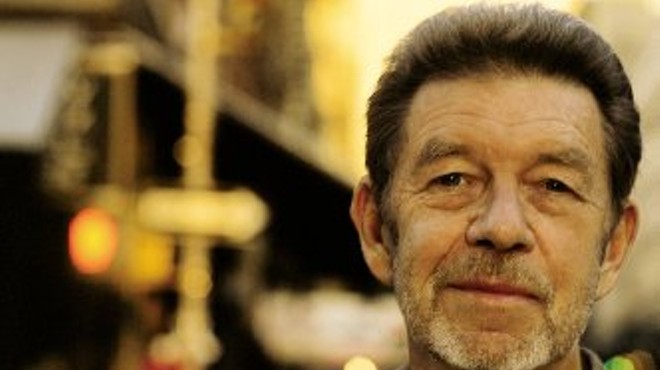Wednesday, October 10, 2012
A Chat With Rebecca Seiferle, the New Tucson Poet Laureate

A portion of this interview by Jarret Keene appears in the Oct. 11 print issue. The extended interview begins after the jump.
It’s been years since Tucson had a poet laureate of our own. Now we have one again, thanks to Mayor Jonathan Rothschild, who, with the help of the Tucson Pima Arts Council, appointed Rebecca Seiferle to serve as our city’s emissary for literacy.
Actually, Seiferle’s résumé almost merits a U.S. poet laureate post. She’s a noted translator of Spanish poetry, and she wins prestigious awards like the Lannan Foundation Poetry Fellowship. More importantly, Seiferle is deeply involved in Tucson’s literary community, teaching writing workshops to middle school and high school students.
In her (unpaid) position, the poet laureate will visit K-12 classrooms and encourage kids to recognize the value of literary culture—and to write some poems themselves. Schools can book Seiferle by calling TPAC at 624-0595, or visit tucsonpimaartscouncil.org.
What were your thoughts on Tucson’s literary community when you moved here six years ago? Has your opinion changed?
One of the reasons I moved to Tucson was my awareness of the rich and diverse literary and artistic community. A few years before, I’d been a visiting writer for the reading series at the University of Arizona Poetry Center and was aware of the vital role the center plays on the local and national level. The literary community here seemed very open and welcoming to possibilities. My sense of that richness, diversity and openness hasn’t changed. I’ve become aware of even more artistic venues in Tucson—dance, collaborative text and performance, spoken word and educational outreach. I have also become aware that at times, the Tucson community resembles a collection of smaller communities. There’s a challenge to bridge some of the gaps.
Can an event like the Tucson Festival of Books help poetry thrive as bookstores close nationwide?
I think festivals like the Tucson Festival of Books create an occasion where the word can flourish. Poetry has the capacity to create a different kind of public space that is seldom created in our culture. Within that space, (there is) play and delight in words, imaginative expression and a sense of community. … I think the festival brings us back to the original power of the word. Also, more practically, readers like to see and hear writers. It’s an interesting fact that poets often derive a better income from readings than from book sales. The writer’s voice, living and audible, is often a way into the book. People are drawn to that human connection.
You edit a literary webzine, The Drunken Boat (thedrunkenboat.com). Do you value online publishing and the printed word equally?
I published the first issue of The Drunken Boat online in April 2000 and was drawn to Internet publication for a number of reasons. The work is accessible globally. Publication doesn’t require great economic resources. And given the limitless nature of a webpage, there are no longer any constraints upon page length or format. The title is taken from French Symbolist poet Arthur Rimbaud’s great poem. But I also envisioned it implying a publication open to poetic enthusiasms, open to work that might elude publication in more-conventional print formats, where page length and line length become prohibitive. I do love the printed page, the printed word and the feel of a book in my hands. For me, both modes of publication are equally valid.
Should poetry uplift us or illuminate hard truths?
Poetry is an illumination of truth. Some truths are hard; others are uplifting. I also feel that illumination of a truth, even a difficult one, brings increased awareness. The scales fall from our eyes, and we simply see. That’s uplifting.
Do you know when you’ve written a great poem?
The perception of a great poem is one given by each reader. Sometimes, luckily, that perception comes back to the writer. In the process of writing, I feel the energy of the poem, the great sweep of it through the room and through me, sometimes like the blow of an angel’s wing. So there’s a sense of having been visited by something within, and also beyond, me.
Is the poet’s role to be an emissary of literacy? What would Ezra Pound think?
Well, one of Pound’s most-influential books is his early ABC of Reading, in which he plays the emissary of literacy to fellow poets, trying to inform poetic practice, to educate the modern era. Like it or not, the poet is a messenger of the word and the word’s power to communicate, for self-expression, to heal or harm. And literacy is the ground we all walk on.
What was the most rewarding part about having served as the board president for a community venue like Casa Libre en la Solana (“free house in the sun”)?
There have been many rewards in having served as board president for Casa Libre en la Solana. And a setback or two. Casa Libre no longer offers residencies for creative writers. Cutbacks in support due to the economic downturn meant that unfortunately we had to suspend the writer’s residency program. Along with the reward of successfully helping to steer Casa Libre to survive as an organization in difficult times, I’ve found most rewarding the launch and success of new programs. For instance, Edge, a reading series for emerging writers, is particularly vital in helping those writers find an audience and support for their early work. Equally rewarding is supporting long-standing programs like the Works-in-Progress reading series, which provides support for writers in the University of Arizona MFA program.
Kore Press, for which you served as the submissions editor, has enjoyed an incredible few years, from putting on the Big Read to wining the 2011 LUMIE award. What do you think of the role this homegrown press has played in the national literary arts scene?
The sheer volume of talented submissions from poets all over the United States, and the world, testifies to the national awareness of Kore Press as a vital presence for women in the literary arts. There are few presses that focus on work by women and have a feminist mission, a focus that is still needed as shown by the data collected by Vida: Women in Literary Arts. That data continues to show an underrepresentation of women writers in most major publications, both in terms of having work published and having work reviewed. Given that, I think Kore Press will continue to grow in significance on the national literary arts scene; for years the Press has had a stellar reputation for its commitment to its mission and the quality of the work Lisa Bowden publishes.
“The Foundling,” a poem about a young girl encountering the ghost of a baby black bear killed by hunters in Idaho, startled me. This, despite the fact the violence happens off-camera, so to speak. Have you ever read this poem to, and received reactions from, school kids?
Thank you! I’m glad that you were startled, because I was startled by that encounter with the baby bear, both as it hung outside my window, and as the ghost in the kitchen. I have read this poem to school kids and have heard their reactions. What they often connect with is the heart of the poem, which is that sense of being an orphan, a foundling child, in the world. Kids connect to the emotion and the real heart of that poem is the feeling of being a “foundling.” The strangeness of the event also connects to their own sense of their own experience, as children, where the world of adults can seem unknown. Oddly enough, the poem has seemed most disconcerting to adults. Adults are startled by the event the poem relates, but perhaps also it opens up that sense of childhood, those moments a child experiences of inhabiting an odd and sometimes disconcerting adult world.
“Room of Dust” is a kind of religious, or at least spiritual, poem. Atheism seems to be in vogue these days, a stance that contradicts much of what, some might say, poetry seeks to accomplish. Do you believe poetry is spiritual?
Yes, I do believe poetry is spiritual. I cannot help it. I grew up as a child listening to my mother read poems and nursery rhymes and also Bible stories to me. As a result, I’ve always had a biblical imagination and if I think of the word “word,” the phrase “in the beginning was the Word” comes to mind immediately, just by association and history. My sense of poetry is somewhat archaic in that regard, as I feel that it’s rooted in that sense of the power of the word, to heal, to communicate, to become who we are.
What’s the real pleasure you get out of working on your translations of, say, Peruvian poet Cesar Vallejo?
Vallejo is very difficult to translate, so complex, and I like this immersion into another sensibility, another language. Vallejo said at one point that each poet has to create his or her own poetic vernacular, so the act of translating brings a focus upon language at the root, its origins. I love the complexity and energy of it, the immersion in his particular vernacular, and another language. The first poem I ever memorized on my own was a poem in French by Charles Baudelaire. From the very beginning, I was drawn to poetry in other languages—first French and then Spanish—because it drew me to that sense of poetry as another language.
Tags: Rebecca Seiferle , Tucson poet laureate


